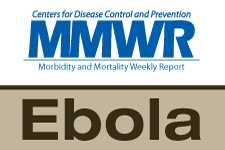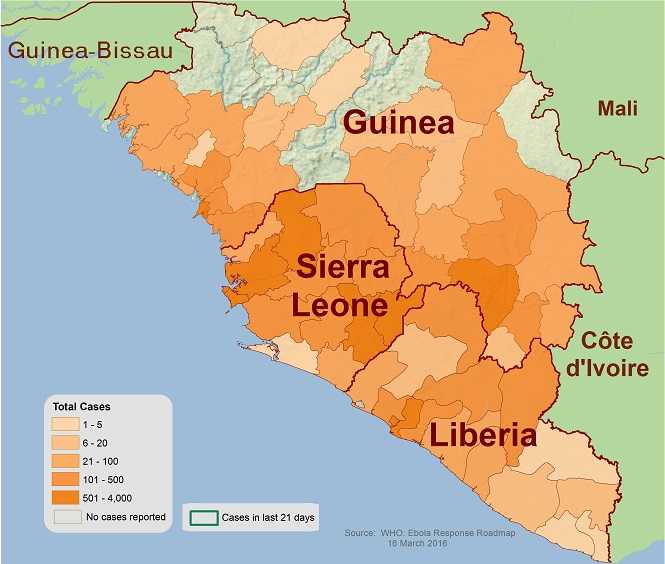2014 Ebola Outbreak in West Africa - Outbreak Distribution Map
CDC classification of countries with reported Ebola cases for evaluation of persons in the United States
| Widespread transmission | Affected areas |
|---|---|
| No countries currently in this classification | None |
| Countries with former widespread transmission and current, established control measures1 | Affected areas |
|---|---|
| Liberia2 | Entire country |
| Sierra Leone3 | Entire country |
| Guinea4 | Entire country |
| Cases in urban settings with uncertain control measures5 | Affected areas |
|---|---|
| No countries currently in this classification | None |
| Cases in urban settings with effective control measures | Affected areas |
|---|---|
| No countries currently in this classification | None |
| Previously affected countries6 | Affected areas |
|---|---|
| Nigeria | Lagos, Port Harcourt |
| Senegal | Dakar |
| Spain | Madrid |
| United States | Dallas, TX; New York City, NY |
| Mali | Bamako |
| United Kingdom | Scotland, England |
| Italy | Sardinia |
1 This category also includes countries that have experienced widespread transmission but are transitioning to being declared free of Ebola. The World Health Organization (WHO) is responsible for determining when a country will be declared free of Ebola virus transmission. Public health authorities in these countries should maintain active surveillance for new cases of Ebola and identify, locate, and monitor any potential contacts.
2 On May 13, 2015, CDC changed the country classification for Liberia to a country with former widespread transmission and current, established control measures.
3 On November 10, 2015, CDC changed the country classification for Sierra Leone to a country with former widespread transmission and current, established control measures.
4 On December 29, 2015, CDC changed the country classification for Guinea to a country with former widespread transmission and current, established control measures.
5 Transmission in urban areas indicates the potential for spread through international air travel. Control measures in these countries are considered to be uncertain because of the inability of public health authorities to identify, locate, or monitor a large proportion of potential contacts. People arriving from these countries should be screened upon entry.
6 In these countries, which previously had locally acquired or imported Ebola cases, at least 42 days (two incubation periods) have elapsed since the last day that any person in the country had contact with a person with confirmed Ebola.
- Page last reviewed: March 17, 2016
- Page last updated: March 17, 2016
- Content source:




 ShareCompartir
ShareCompartir

